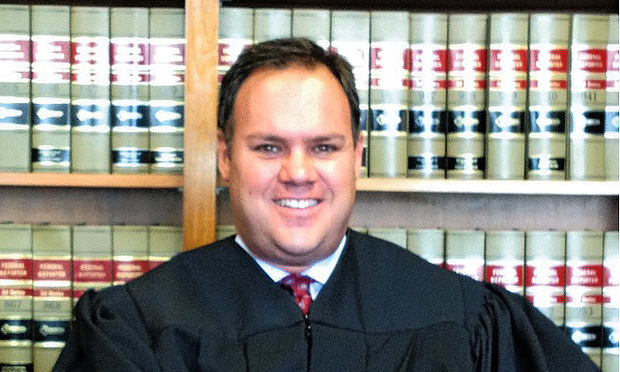Pulling Trade Secrets Suit at 'Halftime' Doesn't Trigger Fees for Defendant, Fifth Circuit Rules
Entitlement to fees "ordinarily requires being ahead when the final whistle blows in a case, not at halftime," the panel said.
November 14, 2018 at 05:10 PM
3 minute read
 U.S. District Judge Gregg Costa of Galveston. Courtesy photo
U.S. District Judge Gregg Costa of Galveston. Courtesy photo
A federal appeals court has ruled that a defendant in a trade secrets case is not a prevailing party and thus entitled to attorney fees when the plaintiff successfully moves to have the lawsuit dismissed without prejudice.
A three-judge panel of the U.S. Court of Appeals for the Fifth Circuit on Tuesday affirmed a ruling by a judge from the Western District of Texas who said that a dismissal without prejudice does not equate to a judgment in favor of the defendant.
“Because such a dismissal does not establish the winner of the dispute, we affirm the denial of fees,” wrote Fifth Circuit Judge Gregg Costa for the panel. Judges W. Eugene Davis and Andrew Oldham joined in the ruling.
Entitlement to fees ”ordinarily requires being ahead when the final whistle blows in a case, not at halftime,” the panel said.
According to the opinion, the dispute involves two Texas companies: Dunster Live and Lonestar Logos Management. The two companies previously were one single entity and had a contract to construct and maintain signs along Texas highways notifying motorists about food, gas and lodging options available at upcoming exits.
The company split in 2016, and Lonestar won the contract for the signs.
Dunster then filed a lawsuit against Lonestar, alleging that Lonestar stole propriety software and a company database in violation of the federal Defend Trade Secrets Act, which allows for the award of attorney fees to prevailing parties.
Dunster sought a protective injunction, which a judge denied. Dunster then moved successfully to have its lawsuit dismissed without prejudice. According to the court, the company “explained that it no longer wished to pursue the federal trade secret claim, which was the only basis for subject matter jurisdiction.”
Lonestar then moved for $600,000 in counsel fees, arguing that it was the prevailing party under the act. The fee petition was denied, but Lonestar appealed, contending that Dunster's move to dismiss the lawsuit without prejudice was made in “bad faith” since it feared it would ultimately lose the lawsuit on the merits, and that the move was “opportunistic.”
The appeals court disagreed.
Lonestar instead argued that it became a prevailing party when the lower court denied Dunster's request for a protective injunction, but that argument failed at the Fifth Circuit, too.
“Defendants argue that even if the dismissal does not make them a prevailing party, they achieved that status earlier in the case when they defeated the request for a protective injunction,” Costa said.
“But prevailing party status ordinarily requires being ahead when the final whistle blows in a case, not at halftime,” he said. “Taking the lead early in the lawsuit … did not make defendants eligible for fees.”
Dunster retained Peter Marketos of Reese Marketos in Dallas. Lonestar turned to Andrew York of Armbrust & Brown in Austin. Neither returned a call seeking comment on the ruling.
This content has been archived. It is available through our partners, LexisNexis® and Bloomberg Law.
To view this content, please continue to their sites.
Not a Lexis Subscriber?
Subscribe Now
Not a Bloomberg Law Subscriber?
Subscribe Now
NOT FOR REPRINT
© 2025 ALM Global, LLC, All Rights Reserved. Request academic re-use from www.copyright.com. All other uses, submit a request to [email protected]. For more information visit Asset & Logo Licensing.
You Might Like
View All
State Bar Ethics Opinion Determines Texas Lawyers Can't Join a Firm With Non-Lawyer Partners
2 minute read

Jones Day Names New Practice Leaders for Antitrust, Business and Tort Litigation and Latin America

Trending Stories
- 1States Accuse Trump of Thwarting Court's Funding Restoration Order
- 2Microsoft Becomes Latest Tech Company to Face Claims of Stealing Marketing Commissions From Influencers
- 3Coral Gables Attorney Busted for Stalking Lawyer
- 4Trump's DOJ Delays Releasing Jan. 6 FBI Agents List Under Consent Order
- 5Securities Report Says That 2024 Settlements Passed a Total of $5.2B
Who Got The Work
J. Brugh Lower of Gibbons has entered an appearance for industrial equipment supplier Devco Corporation in a pending trademark infringement lawsuit. The suit, accusing the defendant of selling knock-off Graco products, was filed Dec. 18 in New Jersey District Court by Rivkin Radler on behalf of Graco Inc. and Graco Minnesota. The case, assigned to U.S. District Judge Zahid N. Quraishi, is 3:24-cv-11294, Graco Inc. et al v. Devco Corporation.
Who Got The Work
Rebecca Maller-Stein and Kent A. Yalowitz of Arnold & Porter Kaye Scholer have entered their appearances for Hanaco Venture Capital and its executives, Lior Prosor and David Frankel, in a pending securities lawsuit. The action, filed on Dec. 24 in New York Southern District Court by Zell, Aron & Co. on behalf of Goldeneye Advisors, accuses the defendants of negligently and fraudulently managing the plaintiff's $1 million investment. The case, assigned to U.S. District Judge Vernon S. Broderick, is 1:24-cv-09918, Goldeneye Advisors, LLC v. Hanaco Venture Capital, Ltd. et al.
Who Got The Work
Attorneys from A&O Shearman has stepped in as defense counsel for Toronto-Dominion Bank and other defendants in a pending securities class action. The suit, filed Dec. 11 in New York Southern District Court by Bleichmar Fonti & Auld, accuses the defendants of concealing the bank's 'pervasive' deficiencies in regards to its compliance with the Bank Secrecy Act and the quality of its anti-money laundering controls. The case, assigned to U.S. District Judge Arun Subramanian, is 1:24-cv-09445, Gonzalez v. The Toronto-Dominion Bank et al.
Who Got The Work
Crown Castle International, a Pennsylvania company providing shared communications infrastructure, has turned to Luke D. Wolf of Gordon Rees Scully Mansukhani to fend off a pending breach-of-contract lawsuit. The court action, filed Nov. 25 in Michigan Eastern District Court by Hooper Hathaway PC on behalf of The Town Residences LLC, accuses Crown Castle of failing to transfer approximately $30,000 in utility payments from T-Mobile in breach of a roof-top lease and assignment agreement. The case, assigned to U.S. District Judge Susan K. Declercq, is 2:24-cv-13131, The Town Residences LLC v. T-Mobile US, Inc. et al.
Who Got The Work
Wilfred P. Coronato and Daniel M. Schwartz of McCarter & English have stepped in as defense counsel to Electrolux Home Products Inc. in a pending product liability lawsuit. The court action, filed Nov. 26 in New York Eastern District Court by Poulos Lopiccolo PC and Nagel Rice LLP on behalf of David Stern, alleges that the defendant's refrigerators’ drawers and shelving repeatedly break and fall apart within months after purchase. The case, assigned to U.S. District Judge Joan M. Azrack, is 2:24-cv-08204, Stern v. Electrolux Home Products, Inc.
Featured Firms
Law Offices of Gary Martin Hays & Associates, P.C.
(470) 294-1674
Law Offices of Mark E. Salomone
(857) 444-6468
Smith & Hassler
(713) 739-1250






